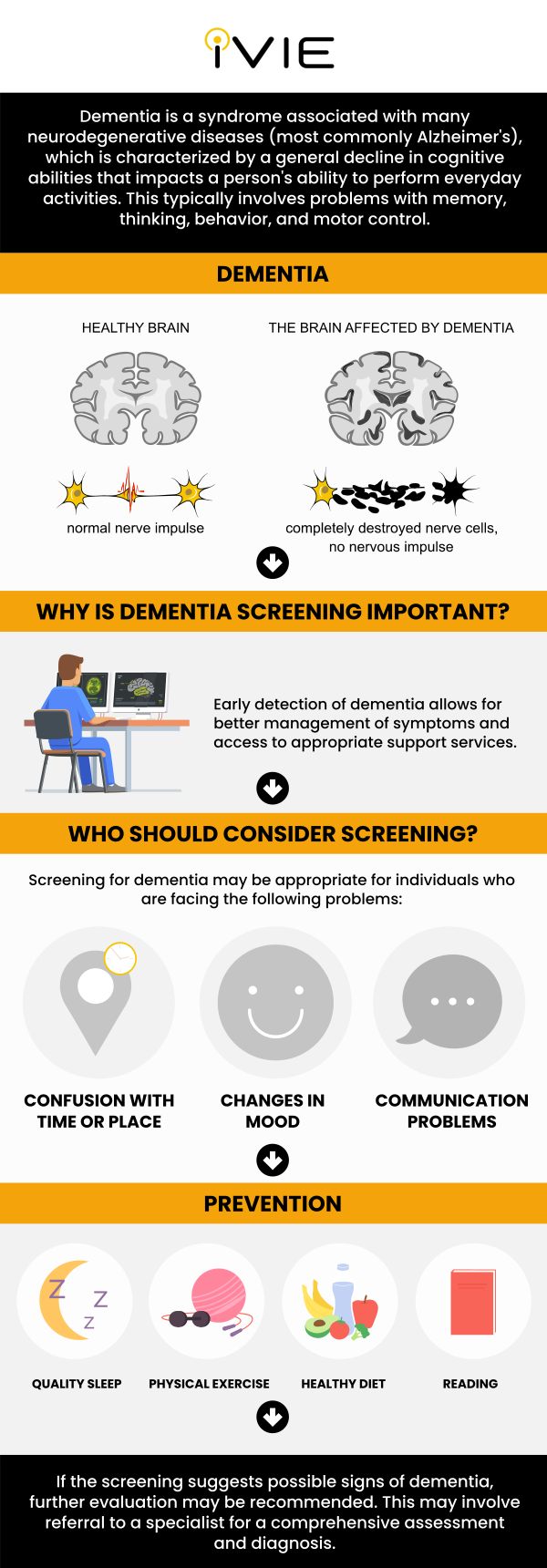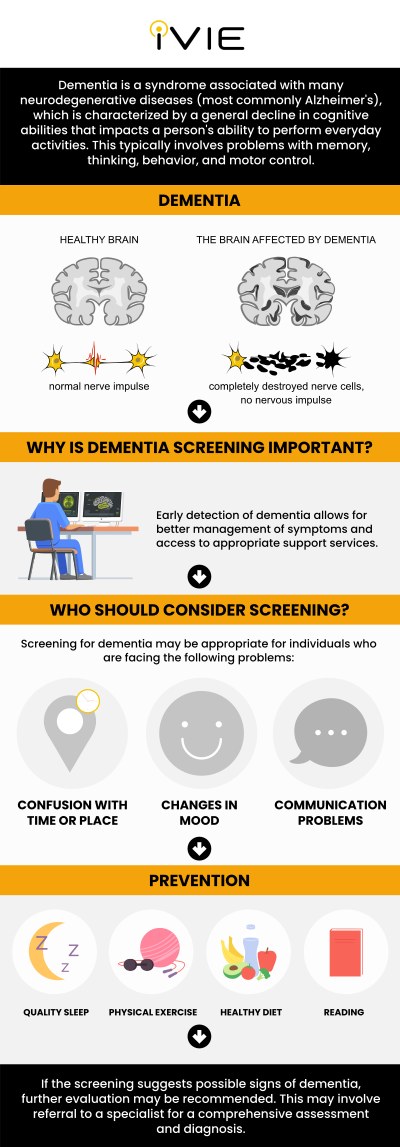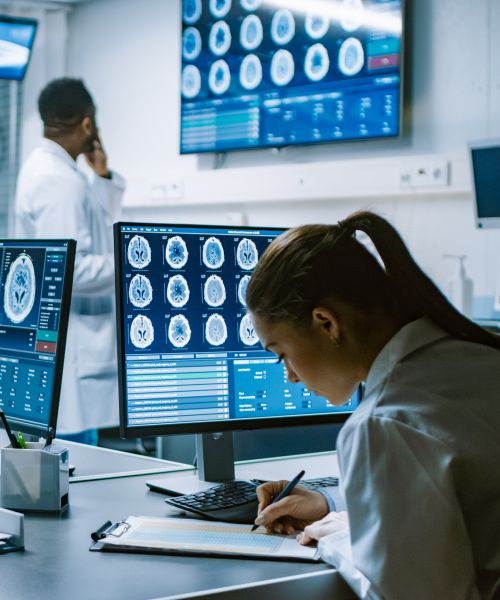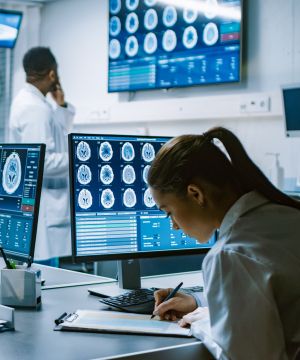How MRI Technology Helps Diagnose Dementia
MRI technology provides detailed brain images, helping doctors identify structural and functional changes indicative of dementia. This non-invasive method enhances early diagnosis and treatment planning for better patient outcomes. Meet Dr. Kourosh Naini and get your dementia screening at the iVIE MRI Screening Center. For more information, contact us or book an appointment online. We are located at 11600 Washington Pl, Suit A, Culver City, CA 90066.


Table of Contents:
How does MRI technology contribute to the diagnosis of dementia?
What specific changes does an MRI detect that indicate dementia?
How accurate are MRI scans in identifying different stages of dementia?
How early can an MRI detect signs of dementia?
At IVIE MRI Screening Center, our use of Magnetic Resonance Imaging (MRI) technology is central to our ability to diagnose and manage conditions like dementia. The importance of this non-invasive, high-resolution imaging technology in not only detecting dementia but also determining its type, monitoring its progression, and supporting research efforts.
With MRI’s superior structural imaging capabilities, we can provide an initial diagnosis of dementia with exceptional accuracy. Our state-of-the-art MRI technology allows us to visualize minute changes in brain volume that indicate neurodegeneration, a hallmark of dementia. By detecting damage to the myelin sheath through white matter lesions, we can identify specific types of dementia such as vascular dementia and Alzheimer’s disease.
Functional imaging with MRI, a key component of our practice, aids us in assessing the integrity and direction of white matter tracts, providing invaluable insights into cognitive impairment in dementia. Our use of functional MRI (fMRI) technology enables us to measure brain activity during specific tasks, which can provide diagnostic information for dementia. Furthermore, we use perfusion-weighted imaging (PWI) to evaluate brain blood flow, which can reveal significant information about potential dementia.
iVIE MRI Screening Center prides itself on utilizing the full potential of MRI technology. Our MRI scans are characterized by their sensitivity and specificity, detecting subtle structural and functional changes in the brain that may not be visible in other imaging modalities. The non-invasive nature of MRI makes it safe for repeated examinations, providing a comprehensive assessment of brain health.
Our practice also uses MRI technology to differentiate between various types of dementia, each associated with damage to specific brain areas. Regular MRI scans can reveal the rate of these brain changes, providing vital information about the speed of the disease’s progression and aiding in the adjustment of treatment plans. Additionally, our MRI technology can rule out other potential causes of dementia-like symptoms, such as brain tumors, subdural hematomas, or normal pressure hydrocephalus, ensuring an accurate diagnosis.
The impact of dementia on brain structure, MRI aids in the development of new treatments and preventive strategies. In conclusion, our practice’s use of MRI technology allows us to accurately diagnose dementia subtypes, monitor disease progression, and assess treatment response, significantly improving our ability to manage dementia.
IVIE MRI Screening Center utilizes the revolutionary medical imaging technique of Magnetic Resonance Imaging (MRI) to provide comprehensive assessments of patient health. This powerful tool is instrumental in diagnosing and monitoring the progression of dementia.
By using MRI, we can identify and measure the volume of various brain structures, such as the hippocampus and entorhinal cortex, which are critical in memory formation. Through this, we can detect areas of atrophy or shrinkage, which are indicative of dementia’s progression and severity. This is especially beneficial for patients with Alzheimer’s disease, as significant shrinkage of the hippocampus is a common feature.
MRI also allows us to observe changes in the brain’s white matter, often seen as bright areas or lesions on the MRI images. These changes, typically resulting from reduced blood flow to those areas, can suggest the presence of vascular dementia, a type of dementia caused by insufficient blood flow to the brain due to conditions like stroke or transient ischemic attack.
Another key feature that can be detected through MRI is the presence of microbleeds, small areas of bleeding within the brain. These have been linked to an increased risk of developing dementia, particularly in older adults.
Not only does MRI aid in detecting these changes, but it also helps assess cerebral blood flow patterns in the brain. Reduced blood flow in certain regions may point to vascular dementia or other conditions leading to dementia.
Finally, MRI is used to rule out other conditions that may mimic dementia symptoms, such as brain tumors or subdural hematomas. By providing a detailed image of the brain, MRI assists in differentiating between these conditions and dementia, ensuring an accurate diagnosis.
Patients visiting the IVIE MRI Screening Center can trust that they are receiving a thorough evaluation using state-of-the-art technology, contributing to precise diagnosis and effective treatment.
At iVIE MRI Screening Center, the application of Magnetic Resonance Imaging (MRI) scans is an integral part of our diagnostic procedures, particularly in the identification and staging of dementia. Dementia is a progressive neurodegenerative disorder that affects memory and cognitive function, and our use of MRI technology allows us to provide a detailed analysis of the brain’s structural and functional changes throughout the different stages of this complex condition.
Early Dementia Detection
MRI scans at iVIE MRI Screening Center have proven to be extremely accurate in detecting the subtle changes in the brain that occur during the early stages of dementia. These scans can pinpoint brain atrophy, particularly in the hippocampus and temporal lobes, leading to an early diagnosis and intervention that could potentially slow down the disease progression.
Dementia Staging
As dementia advances, the accuracy of our MRI scans significantly increases. The scans can identify more distinct atrophy in the brain, especially in areas most affected by different types of dementia such as Alzheimer’s disease and vascular dementia. By comparing MRI scans over time, our medical professionals can monitor disease progression, evaluate response to treatment, and determine the severity of the disease.
Distinguishing Between Dementia Types
Beyond detecting and staging dementia, MRI scans at our practice can also differentiate between various types of dementia. The unique patterns of brain atrophy seen in Alzheimer’s disease can be contrasted with those seen in conditions like frontotemporal dementia, providing a more precise diagnosis.
Understanding the Accuracy and Limitations
Despite their high accuracy, MRI scans are not perfect. Certain types of dementia may not present clear signs of atrophy, and some patients with dementia may have normal MRI results. However, our experts at iVIE MRI Screening Center understand these limitations and consider various factors such as the type of dementia, the stage of the disease, the patient’s age and health status, and the quality of the MRI scan during the interpretation process.
Complementary Diagnostic Tools
At iVIE MRI Screening Center, we believe in a comprehensive approach to diagnosis. Therefore, MRI scans are used alongside other diagnostic methods such as cognitive assessments, neuropsychological tests, and cerebrospinal fluid analysis. This thorough approach enhances diagnostic accuracy and provides a more complete picture of the patient’s cognitive status.
In conclusion, the iVIE MRI Screening Center places great value in the use of MRI scans for the diagnosis and staging of dementia. Despite their limitations, they provide critical information that guides treatment decisions, helping us effectively manage this complex condition.
At the iVIE MRI Screening Center, the use of advanced diagnostic tools such as Magnetic Resonance Imaging (MRI) can provide essential insights into your brain’s structure and function, aiding significantly in detecting various medical conditions, including dementia.
The MRI scans performed at our practice can reveal structural abnormalities in the brain, like decreased brain volume, that might indicate dementia. Our skilled team can interpret these scans to identify signs of cognitive decline, such as shrinkage of the hippocampus, a region of the brain associated with memory, commonly seen in Alzheimer’s disease. We can also identify lesions that suggest underlying damage to the brain’s connections.
Moreover, the iVIE MRI Screening Center can assess functional changes in the brain through functional MRI (fMRI), which may occur early in the course of dementia. Reduced activity in the hippocampus or abnormal resting-state networks can provide clues to cognitive impairment.
In addition to Alzheimer’s, our practice can identify abnormalities related to other forms of dementia like vascular dementia, brain tumors, bleeding in the brain, or a buildup of fluid, leading to dementia symptoms. We can detect smaller strokes or blockages in the brain that might lead to vascular dementia using MRI.
While MRI is a powerful tool, it may not show significant changes in the earliest stages of dementia. This is why the iVIE MRI Screening Center emphasizes a comprehensive assessment that includes a clinical examination, patient history, and cognitive testing for an accurate diagnosis.
By using MRI scans in conjunction with these assessments, we can contribute to an earlier diagnosis of dementia, facilitating timely interventions that can potentially delay or slow cognitive decline. Our primary goal at iVIE MRI Screening Center is to improve outcomes for individuals at risk of developing this debilitating condition by leveraging the power of advanced diagnostic tools like MRI. For more information, contact us or book an appointment online. We are located at 11600 Washington Pl, Suit A, Culver City, CA 90066. We serve patients from Culver City Los Angeles CA, Downtown LA, Beverly Hills CA, Marina del Rey CA, Venice CA, Santa Monica CA, and surrounding areas.


Additional Services You May Need
▸ Dementia Screening
▸ Aneurysm Screening
▸ Spine MRI
▸ Whole Body MRI Screening
▸ MRI Brain Screening
▸ Brain PET
▸ Work/Sport Spine Injury Diagnosis
▸ Work/Sport Brain Injury Diagnosis
▸ Whole Body PET For Cancer
▸ MRA Brain Screening


